Unit 4 I used to be afraid of the dark Section B3 (3a-Self check) 优学案(含答案)
文档属性
| 名称 | Unit 4 I used to be afraid of the dark Section B3 (3a-Self check) 优学案(含答案) |
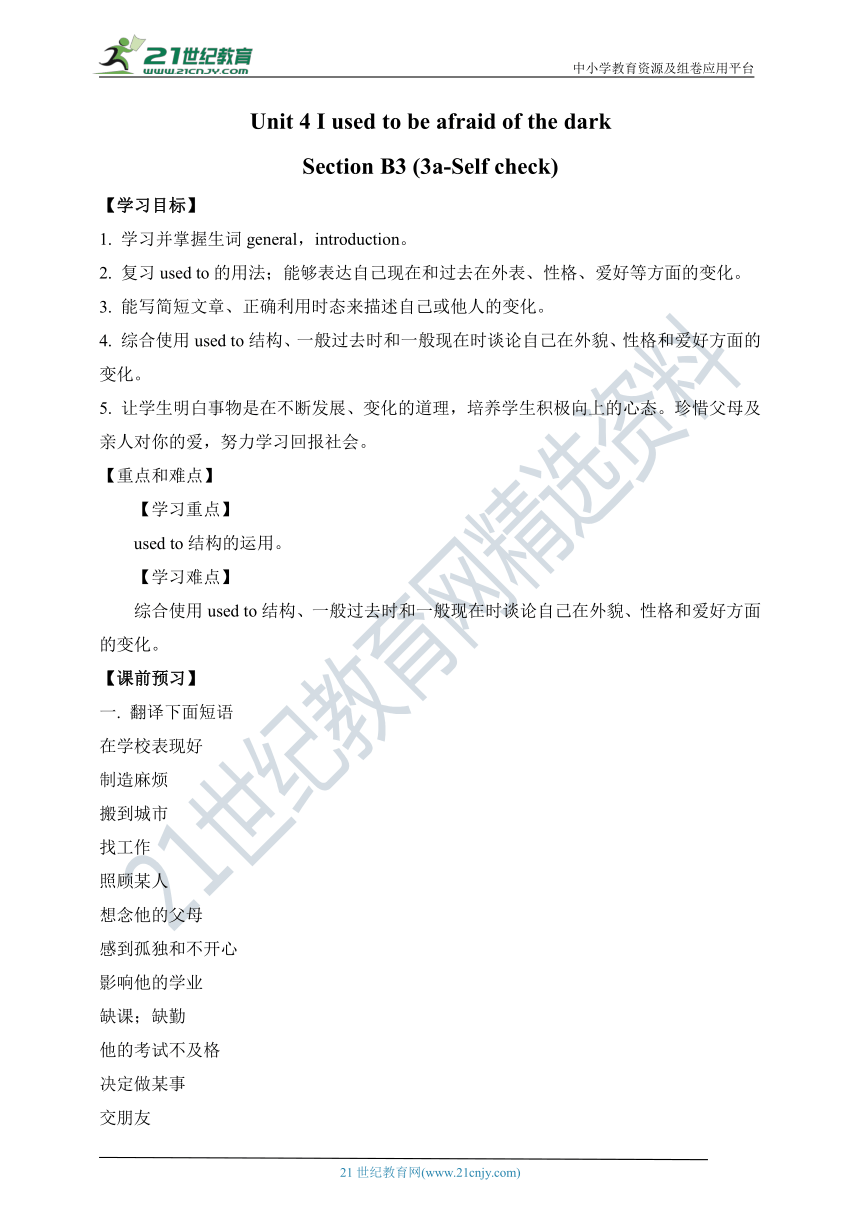
|
|
| 格式 | zip | ||
| 文件大小 | 1.1MB | ||
| 资源类型 | 试卷 | ||
| 版本资源 | 人教新目标(Go for it)版 | ||
| 科目 | 英语 | ||
| 更新时间 | 2019-08-12 00:00:00 | ||
图片预览

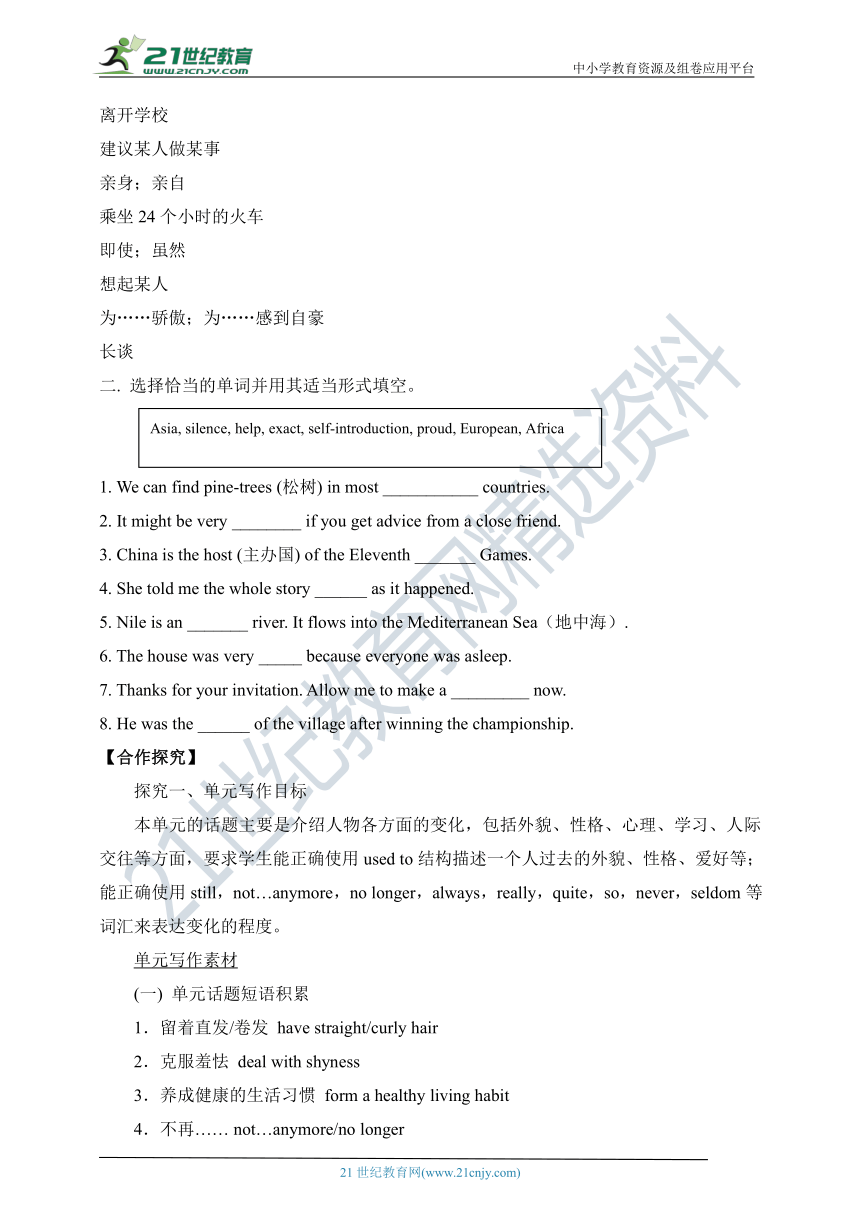
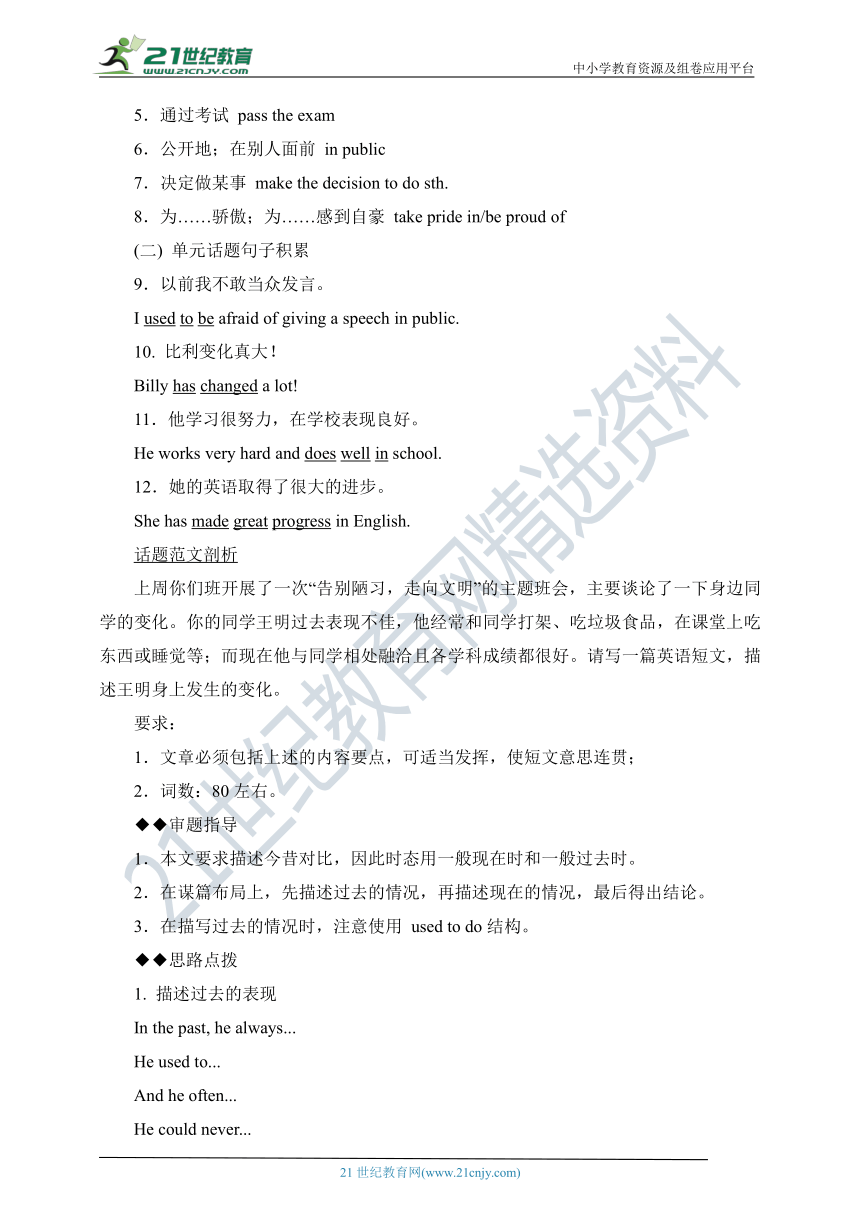
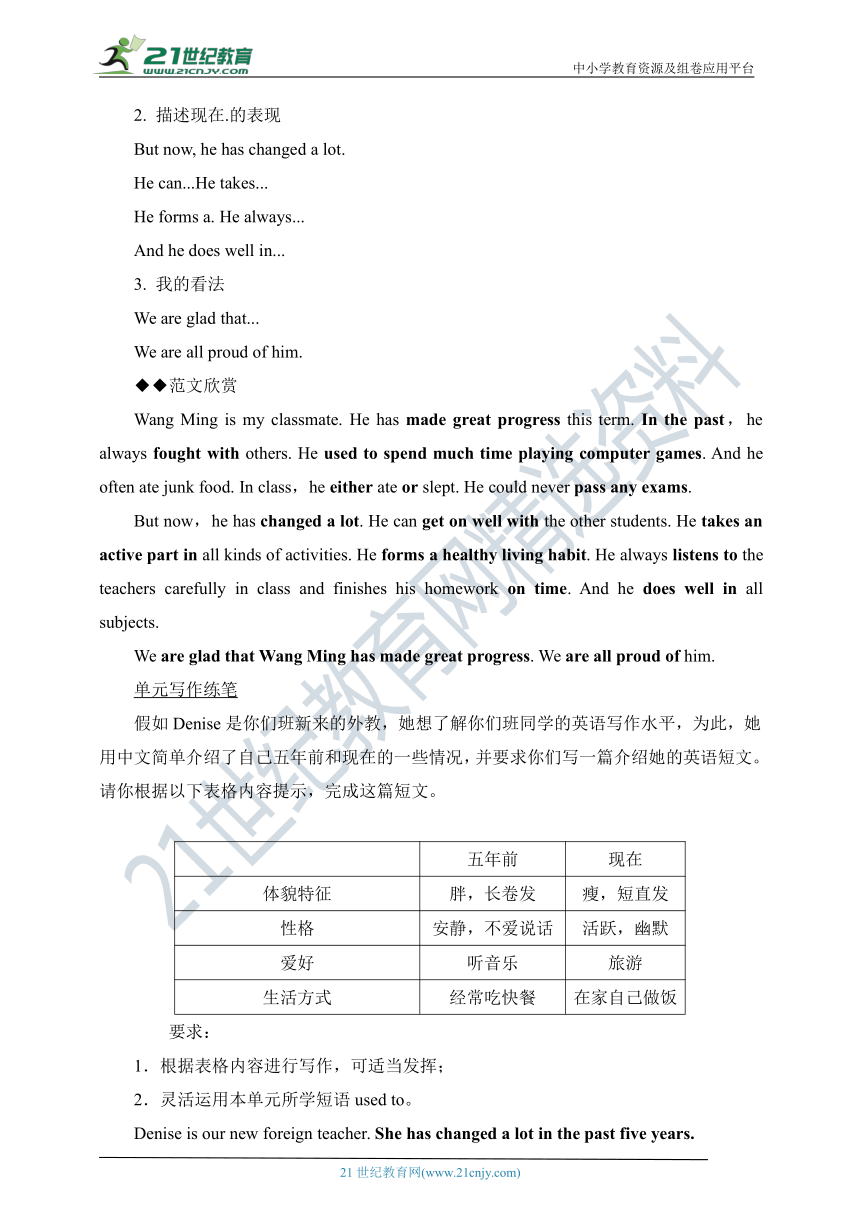
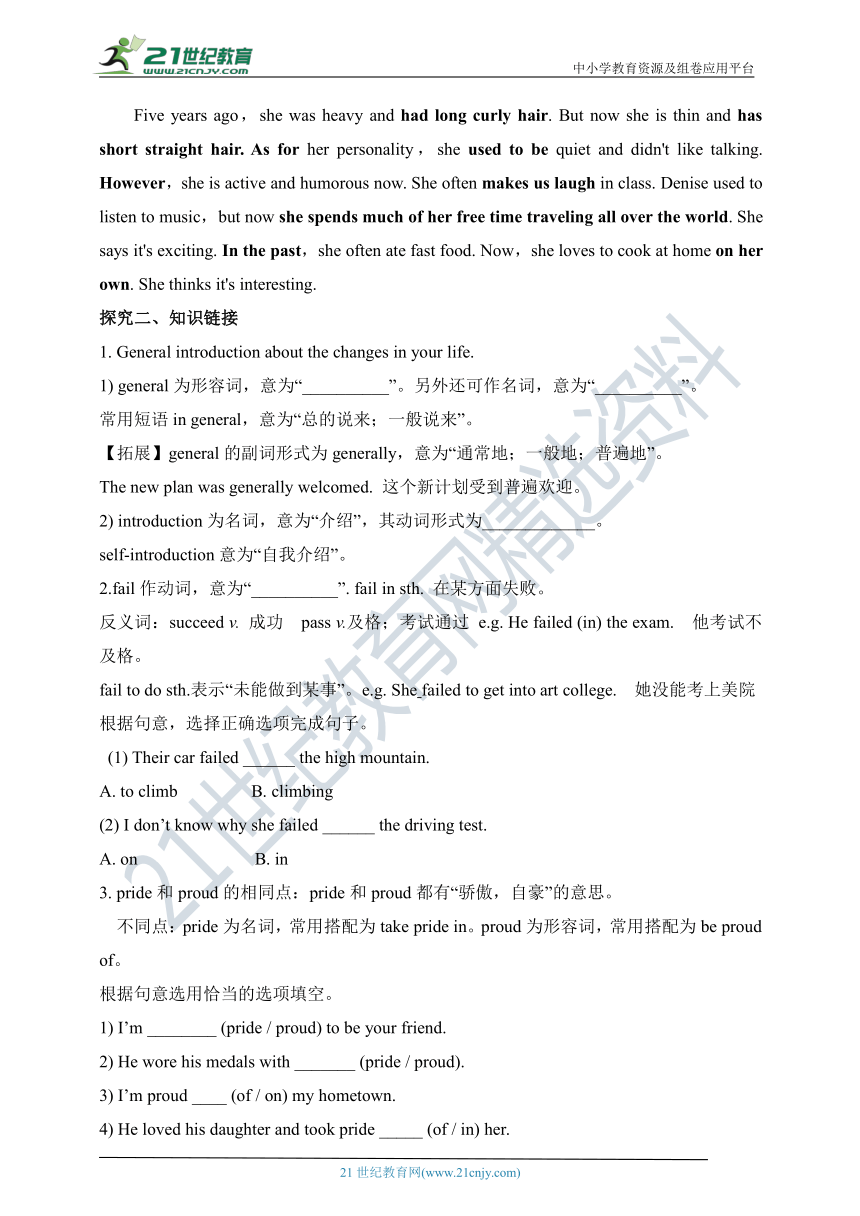
文档简介
Unit 4 I used to be afraid of the dark
Section B3 (3a-Self check)
【学习目标】
1. 学习并掌握生词general,introduction。
2. 复习used to的用法;能够表达自己现在和过去在外表、性格、爱好等方面的变化。
3. 能写简短文章、正确利用时态来描述自己或他人的变化。
4. 综合使用used to结构、一般过去时和一般现在时谈论自己在外貌、性格和爱好方面的变化。
5. 让学生明白事物是在不断发展、变化的道理,培养学生积极向上的心态。珍惜父母及亲人对你的爱,努力学习回报社会。
【重点和难点】
【学习重点】
used to结构的运用。
【学习难点】
综合使用used to结构、一般过去时和一般现在时谈论自己在外貌、性格和爱好方面的变化。
【课前预习】
一. 翻译下面短语
在学校表现好
制造麻烦
搬到城市
找工作
照顾某人
想念他的父母
感到孤独和不开心
影响他的学业
缺课;缺勤
他的考试不及格
决定做某事
交朋友
离开学校
建议某人做某事
亲身;亲自
乘坐24个小时的火车
即使;虽然
想起某人
为……骄傲;为……感到自豪
长谈
二. 选择恰当的单词并用其适当形式填空。
1. We can find pine-trees (松树) in most ___________ countries.
2. It might be very ________ if you get advice from a close friend.
3. China is the host (主办国) of the Eleventh _______ Games.
4. She told me the whole story ______ as it happened.
5. Nile is an _______ river. It flows into the Mediterranean?Sea(地中海).
6. The house was very _____ because everyone was asleep.
7. Thanks for your invitation. Allow me to make a _________ now.
8. He was the ______ of the village after winning the championship.
【合作探究】
探究一、单元写作目标
本单元的话题主要是介绍人物各方面的变化,包括外貌、性格、心理、学习、人际交往等方面,要求学生能正确使用used to结构描述一个人过去的外貌、性格、爱好等;能正确使用still,not…anymore,no longer,always,really,quite,so,never,seldom等词汇来表达变化的程度。
单元写作素材
(一) 单元话题短语积累
1.留着直发/卷发 have straight/curly hair
2.克服羞怯 deal with shyness
3.养成健康的生活习惯 form a healthy living habit
4.不再…… not…anymore/no longer
5.通过考试 pass the exam
6.公开地;在别人面前 in public
7.决定做某事 make the decision to do sth.
8.为……骄傲;为……感到自豪 take pride in/be proud of
(二) 单元话题句子积累
9.以前我不敢当众发言。
I used to be afraid of giving a speech in public.
10. 比利变化真大!
Billy has changed a lot!
11.他学习很努力,在学校表现良好。
He works very hard and does well in school.
12.她的英语取得了很大的进步。
She has made great progress in English.
话题范文剖析
上周你们班开展了一次“告别陋习,走向文明”的主题班会,主要谈论了一下身边同学的变化。你的同学王明过去表现不佳,他经常和同学打架、吃垃圾食品,在课堂上吃东西或睡觉等;而现在他与同学相处融洽且各学科成绩都很好。请写一篇英语短文,描述王明身上发生的变化。
要求:
1.文章必须包括上述的内容要点,可适当发挥,使短文意思连贯;
2.词数:80左右。
◆◆审题指导
1.本文要求描述今昔对比,因此时态用一般现在时和一般过去时。
2.在谋篇布局上,先描述过去的情况,再描述现在的情况,最后得出结论。
3.在描写过去的情况时,注意使用 used to do结构。
◆◆思路点拨
1. 描述过去的表现
In the past, he always...
He used to...
And he often...
He could never...
2. 描述现在.的表现
But now, he has changed a lot.
He can...He takes...
He forms a. He always...
And he does well in...
3. 我的看法
We are glad that...
We are all proud of him.
◆◆范文欣赏
Wang Ming is my classmate. He has made great progress this term. In the past,he always fought with others. He used to spend much time playing computer games. And he often ate junk food. In class,he either ate or slept. He could never pass any exams.
But now,he has changed a lot. He can get on well with the other students. He takes an active part in all kinds of activities. He forms a healthy living habit. He always listens to the teachers carefully in class and finishes his homework on time. And he does well in all subjects.
We are glad that Wang Ming has made great progress. We are all proud of him.
单元写作练笔
假如Denise是你们班新来的外教,她想了解你们班同学的英语写作水平,为此,她用中文简单介绍了自己五年前和现在的一些情况,并要求你们写一篇介绍她的英语短文。请你根据以下表格内容提示,完成这篇短文。
五年前
现在
体貌特征
胖,长卷发
瘦,短直发
性格
安静,不爱说话
活跃,幽默
爱好
听音乐
旅游
生活方式
经常吃快餐
在家自己做饭
要求:
1.根据表格内容进行写作,可适当发挥;
2.灵活运用本单元所学短语used to。
Denise is our new foreign teacher. She has changed a lot in the past five years.
Five years ago,she was heavy and had long curly hair. But now she is thin and has short straight hair. As for her personality,she used to be quiet and didn't like talking. However,she is active and humorous now. She often makes us laugh in class. Denise used to listen to music,but now she spends much of her free time traveling all over the world. She says it's exciting. In the past,she often ate fast food. Now,she loves to cook at home on her own. She thinks it's interesting.
探究二、知识链接
1. General introduction about the changes in your life. 1) general为形容词,意为“__________”。另外还可作名词,意为“__________”。
常用短语in general,意为“总的说来;一般说来”。
【拓展】general的副词形式为generally,意为“通常地;一般地;普遍地”。
The new plan was generally welcomed. 这个新计划受到普遍欢迎。
2) introduction为名词,意为“介绍”,其动词形式为_____________。
self-introduction意为“自我介绍”。
2.fail作动词,意为“__________”. fail in sth. 在某方面失败。
反义词:succeed v. 成功 pass v.及格;考试通过 e.g. He failed (in) the exam. 他考试不及格。
fail to do sth.表示“未能做到某事”。e.g. She failed to get into art college. 她没能考上美院
根据句意,选择正确选项完成句子。
(1) Their car failed ______ the high mountain.
A. to climb??? ?? ?? B. climbing
(2) I don’t know why she failed ______ the driving test.
A. on ? ? ? ? ? ? ? ? ?B. in
3. pride和proud的相同点:pride和proud都有“骄傲,自豪”的意思。
不同点:pride为名词,常用搭配为take pride in。proud为形容词,常用搭配为be proud of。
根据句意选用恰当的选项填空。
1) I’m ________ (pride / proud) to be your friend.
2) He wore his medals with _______ (pride / proud).
3) I’m proud ____ (of / on) my hometown.
4) He loved his daughter and took pride _____ (of / in) her.
【课时小结】
重点单词
1. general adj. 普遍的;常规的;总的 n. 将军
2. introduction n. 介绍
重点词组
1. a general self-introduction一个简要的自我介绍
2. in the last few years 在最近几年
3. the most important change最重要的改变
4. remain silent保持沉默
5. have a great influence on sb.对某人有很大的影响
重点句式
1. My life has changed a lot in the last few years.
我的生活在近几年改变了许多。
2. He used to be a very quiet teenager.
他曾经是个十分安静的青少年。
3. If you are always absent from class, you will fail the examinations.
如果你总是逃课,你考试会不及格的。
4. The teacher took pride in helping his students win the English competition.
老师以帮助学生们赢得了英语竞赛而自豪。
5. Tina played very well in the basketball game and her parents are proud of her.
蒂拉在篮球比赛中打得很好,她的父母为她感到骄傲。
【达标检测】
一. 单项选择。
1. The woman is ___________ and she has a __________ daughter.
A. forty years old; fifteen years old
B. forty-year- old; fifteen-year-old
C. forty-year- old; fifteen years old
D. forty years old; fifteen-year-old
2. This photo often makes me __________ of my teachers in primary school.
A. think B. thinks C. to think D. thinking
3. If you don’t know the meaning of the word __________, you’d better look it up in the dictionary.
A. mostly B exactly C. nearly D. hardly
4. I advise you __________ an umbrella with you. It’s cloudy and it is going to rain.
A. to take B. taking C. take D. taken
5. She used to ___________ a bus to school, but now she is used to __________ to school.
A. taking; walk B. take; walk C. taking; walking D. take; walking
二. 词性转换。
1. There is an __________ (introduce) about England in the book.
2. He was sometimes __________ (absence) from classes last term.
3. I made a ___________ (decide) to go abroad with my parents.
4. Her _____________ (shy) made her be afraid to speak in public.
5. It’s very ____ _ (help) to discuss your problems with your parents.
三. 动词应用。
1. I used to __________ (play) computer games, but I hate them now.
2. He didn’t use to work hard at math, so he often __________ (fail) the math exams.
3. The little boy was afraid of __________ (be) alone at home.
4. They tried ___________ (get) good grades in the final exam.
5. Our teacher advises us ___________ (read) a lot of books to improve our study.
6. Many times I thought about ___________ (give) up my math.
7. I dare ___________ (talk) with foreigners. What about you, Li Lei?
8. My life ___________ (change) a lot in the last few years.
9. The guard made the woman ____________ (wait) outside.
10. His parents made a decision __________ (help) him win the competition.
四. 根据汉语提示完成下列句子,每空一词。
1. My father is _________ (有幽默感的) , and he often tells jokes to me.
2. Tom didn’t use to play soccer, but he played Ping Pong______ (有时).
3. The little boy didn’t know how to _________ (处理) the problem.
4. My son likes watching ants and _________ (其他的昆虫) .
5. Li Wen caused a lot of trouble, his parents wanted to talk to him_________ (亲自) .
6. The girl always works hard, so her teachers _________ her(感到自豪) .
7. She _________ (很少) used to eat junk food .
8. I used to be afraid of _________ (做演讲) in front of my class.
【教师寄语】
【自我评价】
1. 本课我学会了什么?
_________________________________________
2. 通过本课的学习,我还有哪些疑问?
_____________________________________
参考答案:
【课前预习】
一:
do well in school, cause problems, move to the city, look for jobs, take care of sb., miss his parents, feel lonely and unhappy, influence his schoolwork, be absent from classes, fail his examinations, make the decision to do sth., make friends, leave the school, advise sb. to do sth., in person, take a 24-hour train ride, even though, think of sb., take pride in / be proud of, have a long talk?
二:European, helpful, Asian, exactly, African, silent, self-introduction, pride
探究二:
全体的,普遍的,总的;将军;introduce;失败;A, B;proud;pride;of;in
【达标检测】
一1-5 DABAD
二1. introduction 2. absent 3. decision 4. shyness 5. helpful
三1. play 2. failed 3. being 4. to get 5. to read
6. giving 7. to talk 8. has changed 9. wait 10. to help
四1. humorous 2. from time to time 3. deal with 4. other insects
5. in person 6. take pride in/ are proud of 7. seldom 8. giving a speech
Section B3 (3a-Self check)
【学习目标】
1. 学习并掌握生词general,introduction。
2. 复习used to的用法;能够表达自己现在和过去在外表、性格、爱好等方面的变化。
3. 能写简短文章、正确利用时态来描述自己或他人的变化。
4. 综合使用used to结构、一般过去时和一般现在时谈论自己在外貌、性格和爱好方面的变化。
5. 让学生明白事物是在不断发展、变化的道理,培养学生积极向上的心态。珍惜父母及亲人对你的爱,努力学习回报社会。
【重点和难点】
【学习重点】
used to结构的运用。
【学习难点】
综合使用used to结构、一般过去时和一般现在时谈论自己在外貌、性格和爱好方面的变化。
【课前预习】
一. 翻译下面短语
在学校表现好
制造麻烦
搬到城市
找工作
照顾某人
想念他的父母
感到孤独和不开心
影响他的学业
缺课;缺勤
他的考试不及格
决定做某事
交朋友
离开学校
建议某人做某事
亲身;亲自
乘坐24个小时的火车
即使;虽然
想起某人
为……骄傲;为……感到自豪
长谈
二. 选择恰当的单词并用其适当形式填空。
1. We can find pine-trees (松树) in most ___________ countries.
2. It might be very ________ if you get advice from a close friend.
3. China is the host (主办国) of the Eleventh _______ Games.
4. She told me the whole story ______ as it happened.
5. Nile is an _______ river. It flows into the Mediterranean?Sea(地中海).
6. The house was very _____ because everyone was asleep.
7. Thanks for your invitation. Allow me to make a _________ now.
8. He was the ______ of the village after winning the championship.
【合作探究】
探究一、单元写作目标
本单元的话题主要是介绍人物各方面的变化,包括外貌、性格、心理、学习、人际交往等方面,要求学生能正确使用used to结构描述一个人过去的外貌、性格、爱好等;能正确使用still,not…anymore,no longer,always,really,quite,so,never,seldom等词汇来表达变化的程度。
单元写作素材
(一) 单元话题短语积累
1.留着直发/卷发 have straight/curly hair
2.克服羞怯 deal with shyness
3.养成健康的生活习惯 form a healthy living habit
4.不再…… not…anymore/no longer
5.通过考试 pass the exam
6.公开地;在别人面前 in public
7.决定做某事 make the decision to do sth.
8.为……骄傲;为……感到自豪 take pride in/be proud of
(二) 单元话题句子积累
9.以前我不敢当众发言。
I used to be afraid of giving a speech in public.
10. 比利变化真大!
Billy has changed a lot!
11.他学习很努力,在学校表现良好。
He works very hard and does well in school.
12.她的英语取得了很大的进步。
She has made great progress in English.
话题范文剖析
上周你们班开展了一次“告别陋习,走向文明”的主题班会,主要谈论了一下身边同学的变化。你的同学王明过去表现不佳,他经常和同学打架、吃垃圾食品,在课堂上吃东西或睡觉等;而现在他与同学相处融洽且各学科成绩都很好。请写一篇英语短文,描述王明身上发生的变化。
要求:
1.文章必须包括上述的内容要点,可适当发挥,使短文意思连贯;
2.词数:80左右。
◆◆审题指导
1.本文要求描述今昔对比,因此时态用一般现在时和一般过去时。
2.在谋篇布局上,先描述过去的情况,再描述现在的情况,最后得出结论。
3.在描写过去的情况时,注意使用 used to do结构。
◆◆思路点拨
1. 描述过去的表现
In the past, he always...
He used to...
And he often...
He could never...
2. 描述现在.的表现
But now, he has changed a lot.
He can...He takes...
He forms a. He always...
And he does well in...
3. 我的看法
We are glad that...
We are all proud of him.
◆◆范文欣赏
Wang Ming is my classmate. He has made great progress this term. In the past,he always fought with others. He used to spend much time playing computer games. And he often ate junk food. In class,he either ate or slept. He could never pass any exams.
But now,he has changed a lot. He can get on well with the other students. He takes an active part in all kinds of activities. He forms a healthy living habit. He always listens to the teachers carefully in class and finishes his homework on time. And he does well in all subjects.
We are glad that Wang Ming has made great progress. We are all proud of him.
单元写作练笔
假如Denise是你们班新来的外教,她想了解你们班同学的英语写作水平,为此,她用中文简单介绍了自己五年前和现在的一些情况,并要求你们写一篇介绍她的英语短文。请你根据以下表格内容提示,完成这篇短文。
五年前
现在
体貌特征
胖,长卷发
瘦,短直发
性格
安静,不爱说话
活跃,幽默
爱好
听音乐
旅游
生活方式
经常吃快餐
在家自己做饭
要求:
1.根据表格内容进行写作,可适当发挥;
2.灵活运用本单元所学短语used to。
Denise is our new foreign teacher. She has changed a lot in the past five years.
Five years ago,she was heavy and had long curly hair. But now she is thin and has short straight hair. As for her personality,she used to be quiet and didn't like talking. However,she is active and humorous now. She often makes us laugh in class. Denise used to listen to music,but now she spends much of her free time traveling all over the world. She says it's exciting. In the past,she often ate fast food. Now,she loves to cook at home on her own. She thinks it's interesting.
探究二、知识链接
1. General introduction about the changes in your life. 1) general为形容词,意为“__________”。另外还可作名词,意为“__________”。
常用短语in general,意为“总的说来;一般说来”。
【拓展】general的副词形式为generally,意为“通常地;一般地;普遍地”。
The new plan was generally welcomed. 这个新计划受到普遍欢迎。
2) introduction为名词,意为“介绍”,其动词形式为_____________。
self-introduction意为“自我介绍”。
2.fail作动词,意为“__________”. fail in sth. 在某方面失败。
反义词:succeed v. 成功 pass v.及格;考试通过 e.g. He failed (in) the exam. 他考试不及格。
fail to do sth.表示“未能做到某事”。e.g. She failed to get into art college. 她没能考上美院
根据句意,选择正确选项完成句子。
(1) Their car failed ______ the high mountain.
A. to climb??? ?? ?? B. climbing
(2) I don’t know why she failed ______ the driving test.
A. on ? ? ? ? ? ? ? ? ?B. in
3. pride和proud的相同点:pride和proud都有“骄傲,自豪”的意思。
不同点:pride为名词,常用搭配为take pride in。proud为形容词,常用搭配为be proud of。
根据句意选用恰当的选项填空。
1) I’m ________ (pride / proud) to be your friend.
2) He wore his medals with _______ (pride / proud).
3) I’m proud ____ (of / on) my hometown.
4) He loved his daughter and took pride _____ (of / in) her.
【课时小结】
重点单词
1. general adj. 普遍的;常规的;总的 n. 将军
2. introduction n. 介绍
重点词组
1. a general self-introduction一个简要的自我介绍
2. in the last few years 在最近几年
3. the most important change最重要的改变
4. remain silent保持沉默
5. have a great influence on sb.对某人有很大的影响
重点句式
1. My life has changed a lot in the last few years.
我的生活在近几年改变了许多。
2. He used to be a very quiet teenager.
他曾经是个十分安静的青少年。
3. If you are always absent from class, you will fail the examinations.
如果你总是逃课,你考试会不及格的。
4. The teacher took pride in helping his students win the English competition.
老师以帮助学生们赢得了英语竞赛而自豪。
5. Tina played very well in the basketball game and her parents are proud of her.
蒂拉在篮球比赛中打得很好,她的父母为她感到骄傲。
【达标检测】
一. 单项选择。
1. The woman is ___________ and she has a __________ daughter.
A. forty years old; fifteen years old
B. forty-year- old; fifteen-year-old
C. forty-year- old; fifteen years old
D. forty years old; fifteen-year-old
2. This photo often makes me __________ of my teachers in primary school.
A. think B. thinks C. to think D. thinking
3. If you don’t know the meaning of the word __________, you’d better look it up in the dictionary.
A. mostly B exactly C. nearly D. hardly
4. I advise you __________ an umbrella with you. It’s cloudy and it is going to rain.
A. to take B. taking C. take D. taken
5. She used to ___________ a bus to school, but now she is used to __________ to school.
A. taking; walk B. take; walk C. taking; walking D. take; walking
二. 词性转换。
1. There is an __________ (introduce) about England in the book.
2. He was sometimes __________ (absence) from classes last term.
3. I made a ___________ (decide) to go abroad with my parents.
4. Her _____________ (shy) made her be afraid to speak in public.
5. It’s very ____ _ (help) to discuss your problems with your parents.
三. 动词应用。
1. I used to __________ (play) computer games, but I hate them now.
2. He didn’t use to work hard at math, so he often __________ (fail) the math exams.
3. The little boy was afraid of __________ (be) alone at home.
4. They tried ___________ (get) good grades in the final exam.
5. Our teacher advises us ___________ (read) a lot of books to improve our study.
6. Many times I thought about ___________ (give) up my math.
7. I dare ___________ (talk) with foreigners. What about you, Li Lei?
8. My life ___________ (change) a lot in the last few years.
9. The guard made the woman ____________ (wait) outside.
10. His parents made a decision __________ (help) him win the competition.
四. 根据汉语提示完成下列句子,每空一词。
1. My father is _________ (有幽默感的) , and he often tells jokes to me.
2. Tom didn’t use to play soccer, but he played Ping Pong______ (有时).
3. The little boy didn’t know how to _________ (处理) the problem.
4. My son likes watching ants and _________ (其他的昆虫) .
5. Li Wen caused a lot of trouble, his parents wanted to talk to him_________ (亲自) .
6. The girl always works hard, so her teachers _________ her(感到自豪) .
7. She _________ (很少) used to eat junk food .
8. I used to be afraid of _________ (做演讲) in front of my class.
【教师寄语】
【自我评价】
1. 本课我学会了什么?
_________________________________________
2. 通过本课的学习,我还有哪些疑问?
_____________________________________
参考答案:
【课前预习】
一:
do well in school, cause problems, move to the city, look for jobs, take care of sb., miss his parents, feel lonely and unhappy, influence his schoolwork, be absent from classes, fail his examinations, make the decision to do sth., make friends, leave the school, advise sb. to do sth., in person, take a 24-hour train ride, even though, think of sb., take pride in / be proud of, have a long talk?
二:European, helpful, Asian, exactly, African, silent, self-introduction, pride
探究二:
全体的,普遍的,总的;将军;introduce;失败;A, B;proud;pride;of;in
【达标检测】
一1-5 DABAD
二1. introduction 2. absent 3. decision 4. shyness 5. helpful
三1. play 2. failed 3. being 4. to get 5. to read
6. giving 7. to talk 8. has changed 9. wait 10. to help
四1. humorous 2. from time to time 3. deal with 4. other insects
5. in person 6. take pride in/ are proud of 7. seldom 8. giving a speech
同课章节目录
- Unit 1 How can we become good learners.
- Section A
- Section B
- Unit 2 I think that mooncakes are delicious!
- Section A
- Section B
- Unit 3 Could you please tell me where the restroom
- Section A
- Section B
- Unit 4 I used to be afraid of the dark.
- Section A
- Section B
- Unit 5 What are the shirts made of?
- Section A
- Section B
- Review of Units 1-5
- Unit 6 When was it invented?
- Section A
- Section B
- Unit 7 Teenagers should be allowed to choose their
- Section A
- Section B
- Unit 8 It must belong to Carla.
- Section A
- Section B
- Unit 9 I like music that I can dance to.
- Section A
- Section B
- Unit 10 You're supposed to shake hands.
- Section A
- Section B
- Review of Units 6-10
- Unit 11 Sad movies make me cry.
- Section A
- Section B
- Unit 12 Life is full of the unexpected
- Section A
- Section B
- Unit 13 We're trying to save the earth!
- Section A
- Section B
- Unit 14 I remember meeting all of you in Grade 7.
- Section A
- Section B
- Review of Units 11-14
